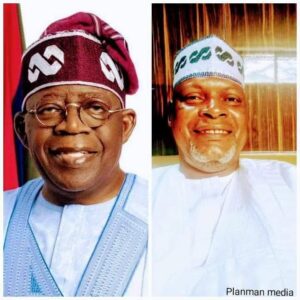 As the 2027 Battle for Power Heats Up, Northern Opposition Faces Daunting Challenges to Unseat Tinubu: Hon Dahiru Hammandikko
As the 2027 Battle for Power Heats Up, Northern Opposition Faces Daunting Challenges to Unseat Tinubu: Hon Dahiru Hammandikko
National Coordinator/ Convener
Northern Region Support’s Tinubu/ Kashim Bold Defense
As Nigeria approaches the 2027 presidential election, there is a rising push among some elements of the opposition, particularly within the northern region, to form a coalition aimed at removing President Bola Ahmed Tinubu from power. However, despite this swelling opposition, Hon. Dahiru Hammadikko, a prominent northern politician and staunch ally of President Tinubu, has strongly dismissed their chances. Hammadikko argues that Tinubu’s first term, characterized by significant reforms, will ultimately lay the groundwork for his overwhelming victory in 2027. In light of this, several key factors indicate why the opposition’s efforts to challenge Tinubu’s re-election bid may be more difficult than they anticipate.
1. A Divided and Disorganized Opposition: A major obstacle facing the opposition is their disunity and lack of a unified vision. According to Hammadikko, the current opposition parties are dominated by individuals who are unwilling to make the necessary sacrifices for the greater good of the country. Each leader is focused on their own presidential aspirations and none are willing to step aside for a more unifying or popular candidate. This entrenched self-interest, Hammadikko suggests, makes the formation of a coherent opposition coalition practically impossible. With such internal fragmentation, the opposition is unlikely to present a formidable alternative to Tinubu’s leadership.
2. The Zoning Dilemma: The issue of zoning, a deeply divisive topic in Nigerian politics, is another significant challenge for the opposition. Zoning has long been a tool to balance power between the North and South, and with the North having held power for eight years under President Buhari, many Southerners are unlikely to accept another northern presidency without the South having its turn. Hammadikko asserts that this regional divide makes it highly improbable for northern opposition leaders to reach an agreement on zoning. Southern opposition members are unlikely to relinquish the opportunity for power, further deepening fractures within the opposition camp.
3. The Opposition’s Lack of Credibility: Hammadikko also takes aim at the credibility of opposition figures, particularly former Vice President Atiku Abubakar. He argues that many of these individuals have been involved in policies and decisions that contributed to the current economic and power sector challenges facing Nigeria. One such example is Atiku’s involvement in the failed $16 billion Independent Power Projects (IPP), which delivered little to no results. Nigerians, Hammadikko believes, will be reluctant to place their trust in the same individuals who have contributed to the country’s problems. This lack of credibility severely weakens the opposition’s appeal and undermines their chances of mounting a serious challenge to Tinubu.
4. Tinubu’s Economic and Energy Reforms: In stark contrast to the opposition’s disarray, President Tinubu has already made significant strides in reforming key sectors of the economy. Under his leadership, inflation, which previously soared above 35%, has been reduced to around 25%. Food prices, which had become a major burden for ordinary Nigerians, are gradually decreasing. Although these reforms have led to short-term challenges, they are expected to yield long-term benefits for the country’s economy. Hammadikko argues that these positive developments will win Tinubu widespread support from the Nigerian public, as they align with his promise to stabilize and revitalize the nation’s economy.
5. Progress in the Energy and Agricultural Sectors: Tinubu’s reforms in the energy sector are already showing promising results. The controversial removal of the fuel subsidy has led to an increase in the supply of refined fuel, thanks to new refineries such as Dangote and NNPC. This has resulted in a reduction in fuel prices, benefiting Nigerians at the grassroots level. Furthermore, the devaluation of the Naira and the decision to float the currency have helped stabilize the exchange rate and boosted the country’s foreign reserves.
In the agricultural sector, the government’s support for farmers, particularly during the dry season, is helping to boost food production, reduce food prices, and improve food security. With these tangible achievements, Tinubu is building a solid foundation that is likely to increase his popularity in the run-up to the 2027 election.
6. Transformative Transportation Initiatives: The transportation sector is another area where Tinubu’s administration is making a significant impact. The government’s initiative to promote compressed natural gas (CNG) as a cleaner and more affordable fuel alternative for transportation promises to reduce the cost of movement across the country. Once vehicle conversion centers are fully established, the price of transportation is expected to drop, easing the economic burdens on Nigerians. This initiative not only supports economic growth but also demonstrates the government’s commitment to sustainable energy solutions.
Conclusion: Given the deep divisions within the opposition, the regional disagreements over zoning, and the lack of credible leadership, it seems unlikely that they will be able to mount a serious challenge to President Tinubu’s re-election bid in 2027. On the other hand, Tinubu’s focus on economic stabilization, energy reform, agricultural support, and transformative transportation policies is already yielding positive results for the country. As these reforms continue to take effect, Nigerians are likely to recognize their long-term benefits, which will only strengthen Tinubu’s popularity.
In light of these developments, it seems that the opposition’s attempts to oust President Tinubu may ultimately fall short. With his reforms taking root and the country experiencing tangible improvements, Tinubu’s path to a second term is looking increasingly secure. In the face of a fractured opposition and a steadily improving Nigeria, it is clear that the 2027 election will likely see Tinubu emerge victorious, as his leadership continues to lay the groundwork for a brighter future for the country.



